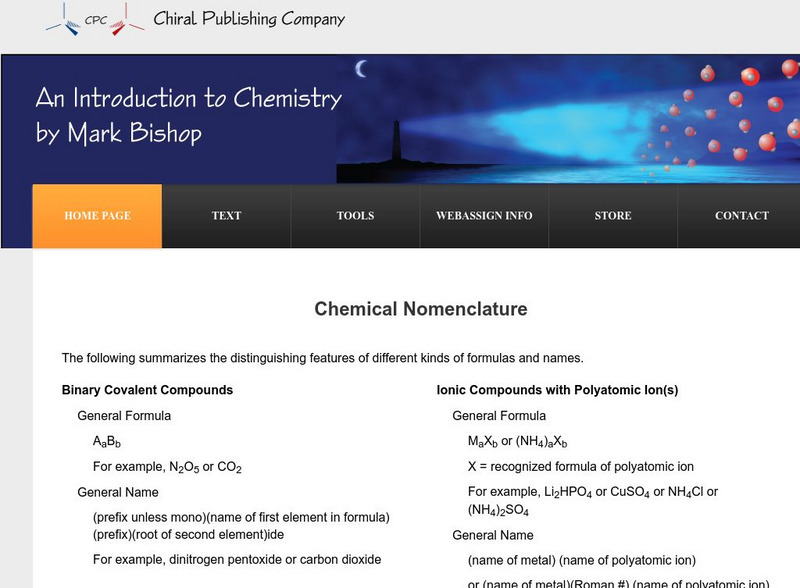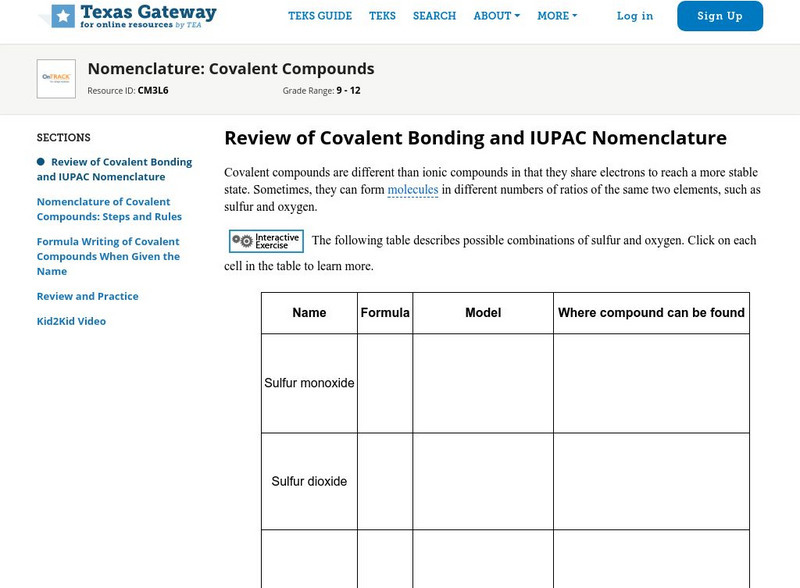Hi, what do you want to do?
Curated OER
Naming Compounds
In this naming compounds worksheet, students are given the formulas of twenty chemical compounds and they give the chemical name of each.
Virginia Department of Education
Soap, Slime, and Creative Chromatography
Do you think chromatography paper suffers from separation anxiety? Young chemists make soap, slime, silly putty, and experiment with chromatography in this lesson. The material includes clear instructions for each experiment along with...
Curated OER
Naming Acids
In this naming acids worksheet, students are given the formulas for 8 acids and they write the chemical name for each. They also are given 8 chemical names of acids and write the formula for each.
Virginia Department of Education
A Crystal Lab
Young chemists grow ionic crystals, metallic crystals, and supersaturated crystals in three different lab experiments. Observing these under a microscope allows pupils to compare the various structures.
Curated OER
Binary Compounds
In this compounds worksheet, students write the oxidation numbers for the given elements and then write the formulas for the given binary compounds. This worksheet has 3 problems to solve.
Virginia Department of Education
Molecular Model Building
During this hands-on activity, young chemists build molecular models based on the Lewis dot structure before studying valence shell electron pair repulsion theory.
American Chemical Society
Development of Baking Powder
Did you know baking powder can be used to treat acne, whiten teeth, and make sugar cookies? The lesson on the development of baking powder is ready-to-go with no preparation required. Through readings, pupils answer questions, complete...
Curated OER
Inorganic Nomenclature
In this nomenclature activity, students draw the structure and write the formula for the given compounds. This activity has 33 problems to solve.
Virginia Department of Education
Solution Concentrations
What happens when you combine 6.022 times 10 to the 23 piles of dirt into one? You make a mountain out of a mole hill. Scholars use dehydration to obtain percent composition and then calculate the molarity of the original...
Virginia Department of Education
Mystery Anions
Lost an electron? You should keep an ion them. Young chemists learn qualitative analysis in the second lesson plan of an 11-part chemistry series. After observing reactions of simple salts, the teacher provides pupils with unknown...
Curated OER
Nomenclature Review
For this nomenclature worksheet, students are given the formulas for ionic compounds, molecular compounds and inorganic acids and they write their names. They also write the formulas given the names of ionic compounds, molecular...
Virginia Department of Education
Partial Pressure
At some point, everyone has been under pressure—even Dalton! Explore Dalton's law of partial pressures with young chemists as they measure the volume of air extracted from a sample compared to its original volume. Class...
Curated OER
Chemical Formulas Unit-Day 4
The purpose of this lesson involves reviewing nomenclature and molecular
formulas as well as introducing naming molecular compounds and identifying acids. The students investigate and understand how conservation of energy
and matter is...
Curated OER
Naming Hydrocarbons Practice
In this hydrocarbons worksheet, students name the hydrocarbons given or draw in the chemical structure from the chemical names. This worksheet has 21 problems to solve.
Curated OER
Oil Embargo!
Ninth graders generate and analyze data to determine which and how much of two polymers best absorb oils, formulate procedure to accurately determine how many times its own weight particular polymer can absorb, and develop understanding...
Curated OER
Type II Binary Ionic Compounds
In this Type II binary ionic compounds worksheet, students give the chemical formula for 22 Type II binary ionic compounds and they given the chemical name for 22 Type II binary ionic compounds.
Curated OER
Naming Inorganic Compounds
In this inorganic compounds learning exercise, students complete 2 charts by writing the names or chemical formulas of given ionic and covalent compounds.
Curated OER
Determine the molarity of an unknown HCl solution
Students complete a lab to help develop a comprehension of stiochiometry. They review equation writing, equation balancing, and stiochiometry. Studnets are given the following information: Sloppy students from the previous class have...
Curated OER
Learning how to balance equations
Students play Chembalancer game and balance equations using the trial and error method.
Curated OER
Love Canal-A Man Made Disaster
High schoolers watch a "Waste Management" Power Point as well as a "Love Canal" PowerPoint (a link is provided for the second presentation). Students write the chemical formula for each chemical and convert the contamination to grams...
Chiral Publishing
Chiral Publishing: An Introduction to Chemistry: Chemical Nomenclature
Read and learn about the process in which compounds are named and written. View several examples of written compounds and have access to links that give more information about writing names and formulas for compounds.
Chiral Publishing
Chiral Publishing: An Introduction to Chemistry: Anion Names and Formulas
Test yourself on the names and formulas of some common anions. This interactive animation makes it fun to learn about atoms that have gained electrons.
Upper Canada District School Board
Tom Stretton's Advanced Placement Chemistry: Atoms, Molecules and Ions
This online textbook chapter provides learners with advanced-level material on the structure and relationships between atoms, molecules and ions.
Texas Education Agency
Texas Gateway: Nomenclature: Covalent Compounds
Given descriptions, diagrams, or scenarios, students will write and name the chemical formulas of binary covalent compounds.




























